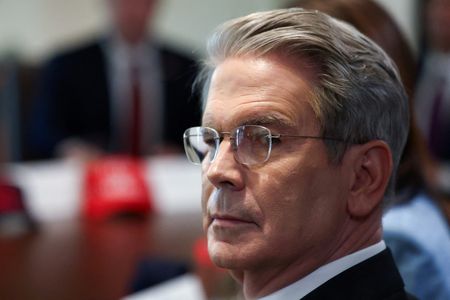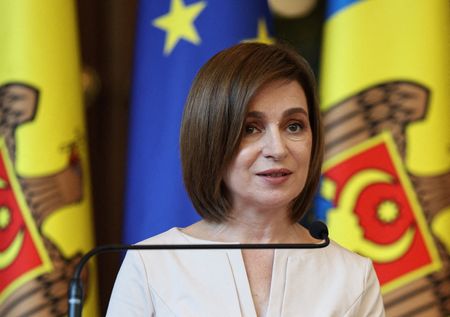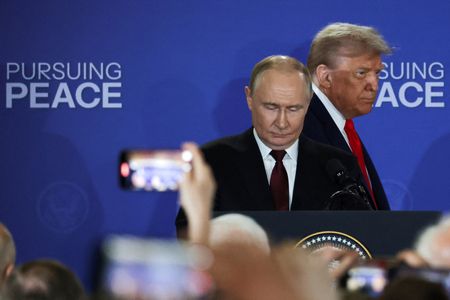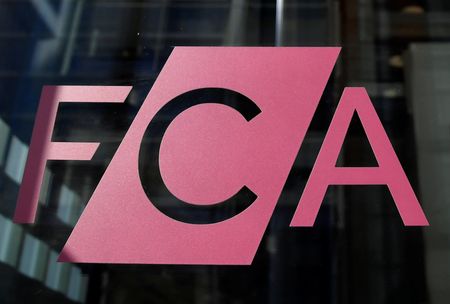By Andrea Shalal and David Lawder
WASHINGTON (Reuters) -U.S. Treasury Secretary Scott Bessent on Tuesday said the Trump administration could announce trade agreements with some of the United States’ largest trade partners as early as this week, but gave no details on which countries were involved.
He said the administration was negotiating with 17 major trading partners, but had not yet engaged with China, the world’s second-largest economy after the United States.
He said many trading partners have made very good offers and Trump officials were in the process of “re-negotiating” those now.
“I expect that we can see a substantial reduction of the tariffs that we are being charged, as well as non-tariff barriers, currency manipulation and subsidies, both labor and capital investment,” he told the House Appropriations Committee.
U.S. President Donald Trump and his top officials have engaged in a flurry of meetings with trading partners since the president on April 2 imposed a 10% tariff on most countries, along with higher tariff rates for many trading partners that were then suspended for 90 days. The U.S. president has also imposed 25% tariffs on autos, steel and aluminum, 25% tariffs on Canada and Mexico, and 145% tariffs on China.
China responded by boosting its tariffs on U.S. goods to 125%. A top European Union official on Tuesday said the 27-nation bloc was readying countermeasures if no trade deal was reached with Washington, adding that it was being contacted by other countries seeking to forge closer trade ties with the EU.
Bessent said about 97% or 98% of the U.S. trade deficit was with about 15 countries, most of which were major trading partners, and discussions were proceeding well with many.
“I would be surprised if we don’t have more than 80 or 90% of those wrapped by the end of the year, and that may be much sooner,” he said. “I would think that perhaps as early as this week we will be announcing trade deals with some of our largest trading partners.”
Bessent faced questions from House Democrats over Trump’s tariff policies, including Representative Mark Pocan from Wisconsin, who repeatedly pressed Bessent on who paid the tariffs and for speaking at investor conferences instead of focussing on the impact on small business owners.
“Right now, we are getting screwed right and left because of the indiscriminate use of tariffs. That’s the reality for Main Street,” Pocan said.
Bessent countered that he had met with over 50 small lenders.
He also pushed back against questions about a possible U.S. recession, saying the data did not show a downturn and predicting that Commerce Department data showing a contraction in the first quarter would likely be revised upward.
The Commerce Department reported last week that GDP decreased at a 0.3% annualized rate last quarter, the first contraction reported in three years.
Trump and top officials, keeping a close eye on negative sentiment in financial markets, have been predicting a trade deal announcement for weeks. On Sunday, Trump told reporters some trade deals could come this week, but gave no details.
Wall Street’s main indexes declined on Tuesday as investors tried to navigate the uncertainty surrounding tariffs, while awaiting the Federal Reserve’s interest rate decision this week.
Administration officials have suggested that India and Japan could be the first countries to sign a trade agreement to lower the tariff rates Trump has threatened. Trump told the NewsNation television network last week that he had “potential” trade deals with India, South Korea and Japan.
Bessent’s comments on the lack of negotiations with China came after Trump on Sunday said that he had no plans to speak with Chinese President Xi Jinping this week, but U.S. officials were speaking with Chinese officials about “different things.”
In an interview with NBC News broadcast on Sunday, Trump acknowledged that he had been “very tough with China,” essentially cutting off trade between the world’s top two economies, but said Beijing now wanted to reach an agreement.
“They want to make a deal. They want to make a deal very badly. We’ll see how that all turns out, but it’s got to be a fair deal,” he said at the time.
(Reporting by Andrea Shalal and David Lawder; Editing by Chizu Nomiyama, Andrea Ricci and Marguerita Choy)











